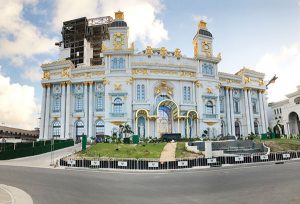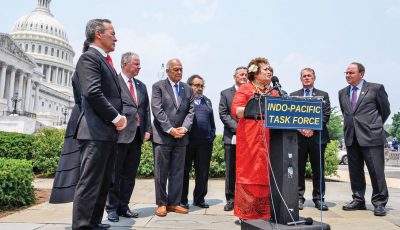Torres: Admin won’t tolerate illegal employment practices
Gov. Ralph DLG Torres emphasized yesterday that his administration would not tolerate illegal employment practices, in the wake of a U.S. Department of Labor announcement that it and four China-based construction contractors who violated U.S. standards of employment have reached a settlement.
In a statement, the administration said it is pleased that U.S. DOL finalized the settlement with MCC International Saipan Ltd. Co., Beilida New Materials System Engineering Co. Ltd., Gold Mantis Construction Decoration, and Sino Great Wall International Engineering Co. LLC to pay a total of $13,972,425 in back wages and liquidated damages to over 2,400 employees.
These construction companies used to have contracts with Imperial Pacific International (CNMI) LLC to build their casino-resort on Saipan, the Imperial Pacific Resort.
“We received assurances from the U.S. DOL last November that there were continu[ous] discussions about a settlement being reached with the contractors who hired these individuals to come to the CNMI and work illegally.
“Throughout the process, the CNMI Department of Labor provided assistance and as much information as possible, not only to U.S. DOL, but to the workers as well,” the statement added.
It is unknown how the U.S. DOL will enforce the settlement since it has been reported earlier that these China-based companies have already fled the CNMI and U.S. DOL doesn’t have jurisdiction over these companies in China.
The U.S. DOL statement, released early morning yesterday, said that MCC, Beilida, and Gold Mantis have employed workers who entered the CNMI as tourists from China. The federal agency also noted that the workers shouldered their own airfare and paid recruitment fees and have incurred debt of about $6,000 or more each.
“We support the U.S. DOL’s findings in ensuring not only back wages, but also liquidated damages that will be paid to employees who were adversely affected at no fault of their own. We also support the U.S. DOL’s enforcement of labor laws. As stated in previous statements and interviews, the governor denounces the illegal practices by these contractors and has already implemented strict local measures to mandate proper employee documentation in order to better assist our federal partners in the enforcement of labor laws,” the statement from the administration noted.
“Let’s be clear. This administration and our community will not tolerate any form of illegal employment practices that harm any worker or our economic viability,” it added.
IPI also pleased; five workers remain
In a separate statement, IPI said it is also pleased to see a resolution to the workers claims.
“While Imperial Pacific is not privy to the terms of the settlement, Imperial Pacific expresses its utmost appreciation to the United States Department of Labor and all parties that were involved in the settlement,” it said. “Imperial Pacific will continue to cooperate with all stakeholders and follow all local and federal laws and regulations.”
According to sources close to the workers, there are at lease five remaining Chinese workers “who were employed by MCC that still have not been compensated what they are owed under the law.”
Gong Benji, one of the five workers, said his coworkers have been able to receive back pay, liquidated damages, and compensation for recruitment fees. He added that news surrounding another settlement with MCC to include the five remaining workers existed; however, they were not informed of the specifics.
“So how can we return home and face the people who loaned us money to come here? We cannot simply tell the loan sharks that there is a press release. We need to give them money. At one point, Imperial Pacific offered to pay us only our back pay if we agreed to return [to] China, but this would not even cover our debt, so we refused. In retaliation, Imperial Pacific then stopped providing us with housing, food, or water. Imperial Pacific benefits every day from the casino we built. Why don’t they pay us our back pay, liquidated damages, and recruitment fees like our co-workers received?” Gong asked in a message translated from Chinese to English by his lawyer.
Gong was reportedly offered $2,093.82 in compensation to return to China. The amount excluded recruitment fees, liquidated damages, and “nothing for the fact that he has been waiting a year to be paid what he is legally owed,” said a lawyer familiar with the case.
According to Gong, his colleagues received from $12,000 to $15,000 in settlements, while others were even paid over $20,000.
Previous statements from the CNMI DOL noted that the calculations in the offers made to the workers were derived from the hours they worked at the rate of the minimum wage back then.




























